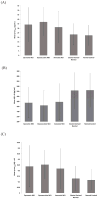Susceptibility of the conventional criteria for mild cognitive impairment to false-positive diagnostic errors
- PMID: 24857234
- PMCID: PMC4241187
- DOI: 10.1016/j.jalz.2014.03.005
Susceptibility of the conventional criteria for mild cognitive impairment to false-positive diagnostic errors
Abstract
Background: We assessed whether mild cognitive impairment (MCI) subtypes could be empirically derived within the Alzheimer's Disease Neuroimaging Initiative (ADNI) MCI cohort and examined associated biomarkers and clinical outcomes.
Methods: Cluster analysis was performed on neuropsychological data from 825 MCI ADNI participants.
Results: Four subtypes emerged: (1) dysnomic (n = 153), (2) dysexecutive (n = 102), (3) amnestic (n = 288), and (4) cluster-derived normal (n = 282) who performed within normal limits on cognitive testing. The cluster-derived normal group had significantly fewer APOE ε4 carriers and fewer who progressed to dementia compared with the other subtypes; they also evidenced cerebrospinal fluid Alzheimer's disease biomarker profiles that did not differ from the normative reference group.
Conclusions: Identification of empirically derived MCI subtypes demonstrates heterogeneity in MCI cognitive profiles that is not captured by conventional criteria. The large cluster-derived normal group suggests that conventional diagnostic criteria are susceptible to false-positive errors, with the result that prior MCI studies may be diluting important biomarker relationships.
Keywords: Alzheimer's disease; Cluster analysis; Dementia; MCI; Mild cognitive impairment; Misclassification; Misdiagnosis; Neuropsychology.
Copyright © 2015 The Alzheimer's Association. Published by Elsevier Inc. All rights reserved.
Conflict of interest statement
Figures



References
-
- Petersen RC. Mild cognitive impairment as a diagnostic entity. J Intern Med. 2004;256(3):183–194. - PubMed
-
- Petersen RC, Morris JC. Mild cognitive impairment as a clinical entity and treatment target. Arch Neurol. 2005;62(7):1160–1163. - PubMed
-
- Winblad B, Palmer K, Kivipelto M, Jelic V, Fratiglioni L, Wahlund LO, et al. Mild cognitive impairment – beyond controversies, towards a consensus: Report of the International Working Group on Mild Cognitive Impairment. J Intern Med. 2004;256(3):240–246. - PubMed
Publication types
MeSH terms
Substances
Grants and funding
- K01 AG030514/AG/NIA NIH HHS/United States
- P50 AG005131/AG/NIA NIH HHS/United States
- CAPMC/ CIHR/Canada
- P50 AG05131/AG/NIA NIH HHS/United States
- U19 AG024904/AG/NIA NIH HHS/United States
- R01 AG012674/AG/NIA NIH HHS/United States
- P30 AG010129/AG/NIA NIH HHS/United States
- T32 MH018399/MH/NIMH NIH HHS/United States
- R01 AG16495/AG/NIA NIH HHS/United States
- R01 AG016495/AG/NIA NIH HHS/United States
- K24 AG026431/AG/NIA NIH HHS/United States
- U01 AG024904/AG/NIA NIH HHS/United States
- U19 AG010483/AG/NIA NIH HHS/United States
LinkOut - more resources
Full Text Sources
Other Literature Sources
Medical
Miscellaneous

